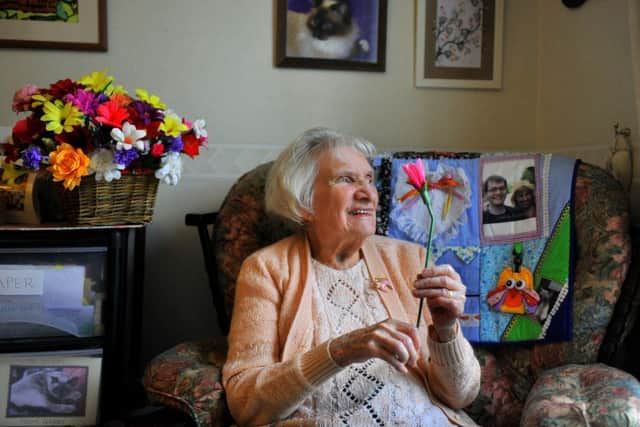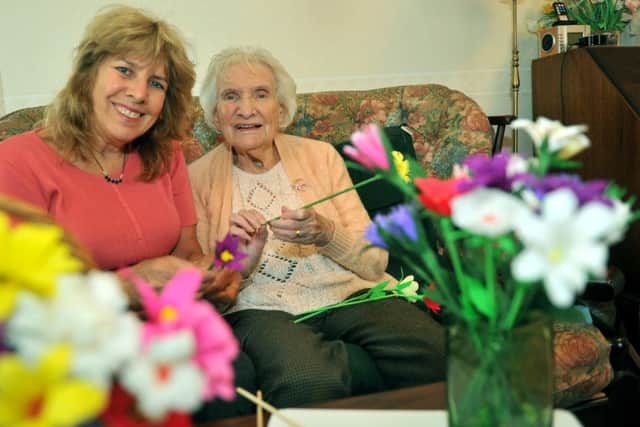How setting up a business aged 88 has helped dementia sufferer Margaret
Margaret Reed is concentrating on making bunches of vividly coloured flowers, with a smile on her face.
But this is not just an enjoyable hobby or a creative therapy for the 88-year-old dementia sufferer, it is a business.
Advertisement
Hide AdAdvertisement
Hide AdMargaret’s daughter Heather O’Neil encouraged her mother, who has always been creative, to start making paper flowers and other crafts after she was diagnosed with dementia in 2012.


“She was very good at hiding it from everyone to start with as she is a very bright woman, so she may well have developed memory problems sooner,” says Heather, from Bedale.
“We were devastated when she was diagnosed and I started researching ways of stimulating her memory and keeping her active and above all happy.”
Heather discovered three different therapies that were supposed to help people with dementia, or memory loss as Heather prefers to call it.
Advertisement
Hide AdAdvertisement
Hide Ad“As a term I find dementia is very scary and harsh. I think memory loss or memory problems is a much kinder was to describe the disease,” says the mum-of-one.


The therapies were art therapy, music therapy and pet therapy and so she set about trying to help her mother.
“My mother has always been very creative and an accomplished artist and seamstress, she could turn her hand to anything really. When I am not with her she does tend to get anxious and fidgets, even if I am just in the kitchen making tea, and so I try to keep her hands and her mind busy. She loves making crepe paper flowers, and we always have some creative project on the go.”
But Margaret’s creative projects cost money and Heather, who works in business development in Northallerton has had to reduce her hours to look after her mum and stepdad, who has heart problems.
Advertisement
Hide AdAdvertisement
Hide Ad“We moved them closer to us and that means that I can go in three times a day to look after them and check they are OK. I have a very understanding boss but my reduced hours mean reduced pay and mum’s art was costing a lot.”


And so they came up with the idea of selling Margaret’s flowers and her other crafts and set up a business through the online store Etsy.
“People are now buying mum’s flowers from all over the country and beyond. Not only is she self-sufficient now, paying for her own arts and crafts supplies, but we have also just handed over a cheque for £500 to the Alzheimer’s Society for all the support they have given us. Not bad running your own business at 88.”
Margaret also attends an Alzheimer’s Society run music therapy session called Singing for the Brain.
Advertisement
Hide AdAdvertisement
Hide Ad“She looks forward to it every month as not only does she enjoy the singing, but it gives her the chance to interact with other people in a social setting.
“The Alzheimer’s Society has been so supportive to us and we wanted to give something back, 25 per cent of each flower sale goes to the Alzheimer’s Society.”
Music has also helped bring Heather’s mum and her stepdad closer together.
“My son bought my stepdad an Amazon Echo which which has been the most helpful of things. It means he can easily get it to play all the old dance music from the 1940s and 1950s that my mum loves and it gives them something to talk about and has really brought them together again.”
Advertisement
Hide AdAdvertisement
Hide AdHeather’s research also found that pet therapy has been found to help people with dementia.
“Mum has always been an animal lover and had pets, at the moment she has a Siamese cross Ragdoll called Gabby who she absolutely adores.
“Through research I have found that there are many benefits from having a pet and I also take mum to visit petting farms which she really love. It really reduces her agitation, blood pressure and increases her pleasure,” says Heather, who has not had a night away in four years.
“I just wouldn’t be able to relax and I can often get calls through the night if my stepdad can’t settle mum for some reason and I have to go over,” says Heather, herself an accomplished artist. “I used to like horse riding but I don’t do that any more as I don’t like to go anywhere where there’s no phone signal.”
Advertisement
Hide AdAdvertisement
Hide AdIt was Heather’s son Liam who suggested she started a Facebook page and blog sharing what she has learnt about dementia and alternative therapies.
“Creative Carer now has 3,000 followers from all over the world. Not only do I share what I have learnt but I also learn from other people and that really helps.”
Heather is also on a number of forums and support groups which she finds helpful, as she battles for as long as she can for her mum to stay in her own home and keep as much independence as she can.
But Heather also wants her mum to enjoy her life as much as she can.
Advertisement
Hide AdAdvertisement
Hide Ad“I treasure this time with my mum, she is such a joy. We do puzzles together and seeing her connect is incredibile. Caring for someone with Alzheimer’s changes your life. It’s an emotional rollercoaster of love, anger, guilt and sadness.
“While arts and crafts cannot cure my mum’s dementia they give her a way to express herself and a sense of personal accomplishment and the simply the joy of the artistic process.”
The Alzheimer’s Society is calling for more investment nto research into the benefots of alterntative and complementary therapies for people with dementia.
Judith King, Head of Region for Alzheimer’s Society in Yorkshire, said: “Alzheimer’s Society runs Singing for the Brain sessions at locations across the UK and we know from what service users tell us how much it means to them.
Advertisement
Hide AdAdvertisement
Hide Ad“The therapeutic benefits of music and singing can help people living with dementia to improve wellbeing and confidence.
“Music can also encourage the expression of positive emotions and enhance communication skills.
“Indeed, it’s widely thought that participation in the arts in general can improve quality of life and wellbeing by stimulating emotions and creativity.”
For more information or to find a Singing for the Brain group near you visit www.alzheimers.org.uk/get-support/your-support-services
For more information on all three therapies and to read Heather’s blog visit creative-carer.com